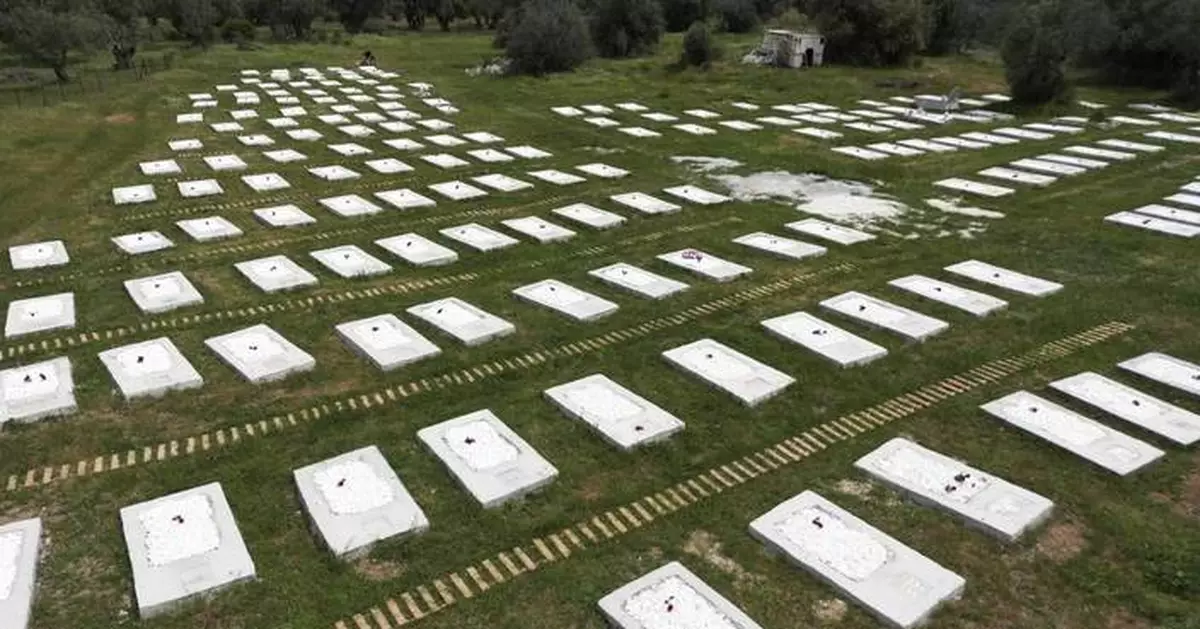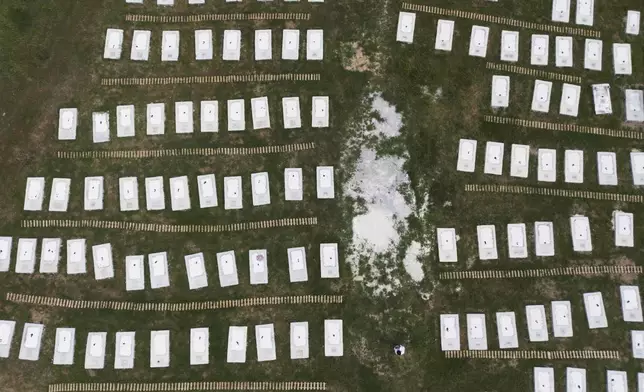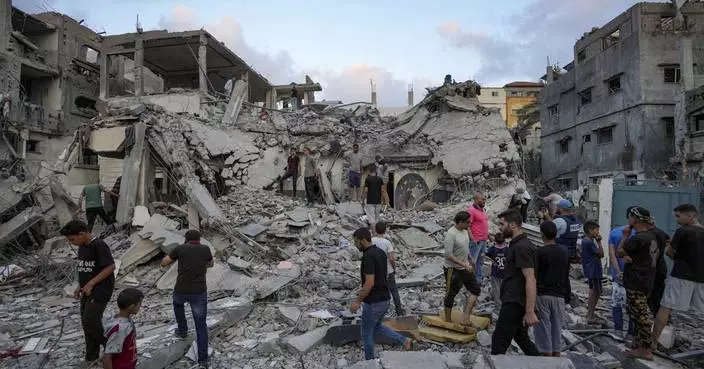LESBOS, Greece (AP) — Most drowned making the hazardous sea crossing from nearby Turkey, while others died of natural causes in migrant camps on the Greek island of Lesbos.
After years of neglect, a makeshift burial ground for migrants on the island has been cleaned up and landscaped to provide a dignified resting place for the dead, and for their relatives to visit.
Click to Gallery
LESBOS, Greece (AP) — Most drowned making the hazardous sea crossing from nearby Turkey, while others died of natural causes in migrant camps on the Greek island of Lesbos.
A cemetery is seen from above at Kato Tritos village on the northeastern Aegean Sea island of Lesbos, Greece, on Wednesday, April 17, 2024. After years of neglect, a primitive burial ground for refugees who died trying to reach Greece's island of Lesbos has been cleaned up and redesigned to provide a dignified resting place for the dead. (AP Photo/Panagiotis Balaskas)
A boy lays flowers on a grave at the cemetery in Kato Tritos village on the northeastern Aegean Sea island of Lesbos, Greece, on Wednesday, April 17, 2024. After years of neglect, a primitive burial ground for refugees who died trying to reach Greece's island of Lesbos has been cleaned up and redesigned to provide a dignified resting place for the dead. (AP Photo/Panagiotis Balaskas)
A woman walks at the cemetery in Kato Tritos village on the northeastern Aegean Sea island of Lesbos, Greece, on Wednesday, April 17, 2024. After years of neglect, a primitive burial ground for refugees who died trying to reach Greece's island of Lesbos has been cleaned up and redesigned to provide a dignified resting place for the dead. (AP Photo/Panagiotis Balaskas)
People visit the cemetery at Kato Tritos village on the northeastern Aegean Sea island of Lesbos, Greece, on Wednesday, April 17, 2024. After years of neglect, a primitive burial ground for refugees who died trying to reach Greece's island of Lesbos has been cleaned up and redesigned to provide a dignified resting place for the dead. (AP Photo/Panagiotis Balaskas)
A cemetery is seen from above at Kato Tritos village on the northeastern Aegean Sea island of Lesbos, Greece, on Wednesday, April 17, 2024. After years of neglect, a primitive burial ground for refugees who died trying to reach Greece's island of Lesbos has been cleaned up and redesigned to provide a dignified resting place for the dead. (AP Photo/Panagiotis Balaskas)
Earth Medicine, the Lesbos-based charity that handled the project near the village of Kato Tritos, formally handed over the redesigned cemetery to municipal officials on Wednesday.
“We wanted it to be clear that this was a burial ground, (mostly) for people who died at sea — some of whom have been identified while others have not,” Earth Medicine spokesman Dimitris Patounis said. “It used to be just a field.”
For years, Lesbos has been a major destination for people seeking a better life in the European Union. They leave Turkish shores crammed into small, unseaworthy vessels provided by smuggling gangs. About 3,800 people have made the journey so far this year.
Before the intervention, the weed-choked graves were marked by a simple stone with a number written on it by marker, or, in the rare cases when it was available, a name. Currently, about 200 neat, uniform gray slabs filled with white gravel cover each grave, clearly listing whatever is known of the occupant.
“Now people will be able to visit when their (dead) relatives are identified,” Patounis said.
Officials stress that the burial ground is nondenominational, with recent inhumation services conducted by an Imam, a Greek Orthodox or a Catholic priest, according to the deceased's known beliefs.
“This was done with human dignity in mind, without any religious affiliation,” Patounis said.
The cemetery lies about a kilometer (½ mile) outside Kato Tritos in central Lesbos, around 20 kilometers (12 miles) from the island capital of Mytilini. Other migrants have been buried in the past in municipal cemeteries in other parts of the island, but this is the only burial ground specifically for migrants.
Follow AP’s coverage of global migration at https://apnews.com/hub/migration
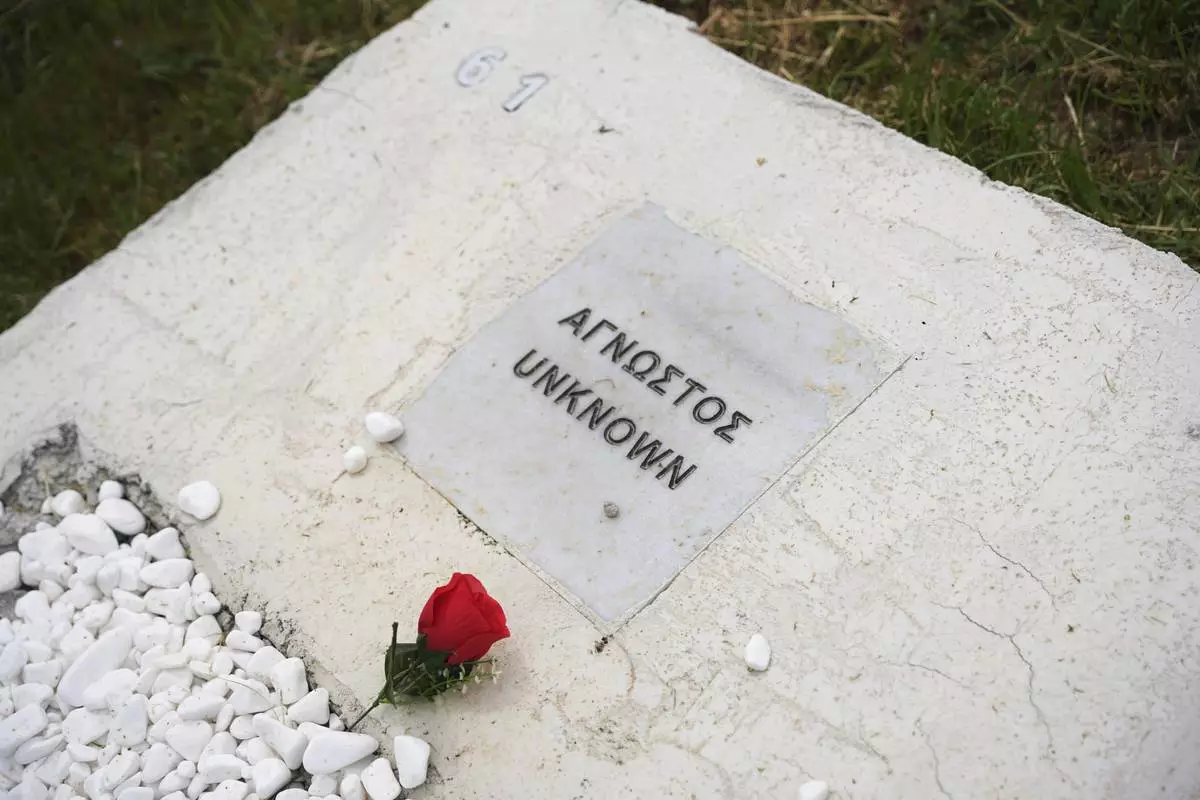
A grave of an unknown refugee is seen at the cemetery in Kato Tritos village on the northeastern Aegean Sea island of Lesbos, Greece, on Wednesday, April 17, 2024. After years of neglect, a primitive burial ground for refugees who died trying to reach Greece's island of Lesbos has been cleaned up and redesigned to provide a dignified resting place for the dead. (AP Photo/Panagiotis Balaskas)

A cemetery is seen from above at Kato Tritos village on the northeastern Aegean Sea island of Lesbos, Greece, on Wednesday, April 17, 2024. After years of neglect, a primitive burial ground for refugees who died trying to reach Greece's island of Lesbos has been cleaned up and redesigned to provide a dignified resting place for the dead. (AP Photo/Panagiotis Balaskas)
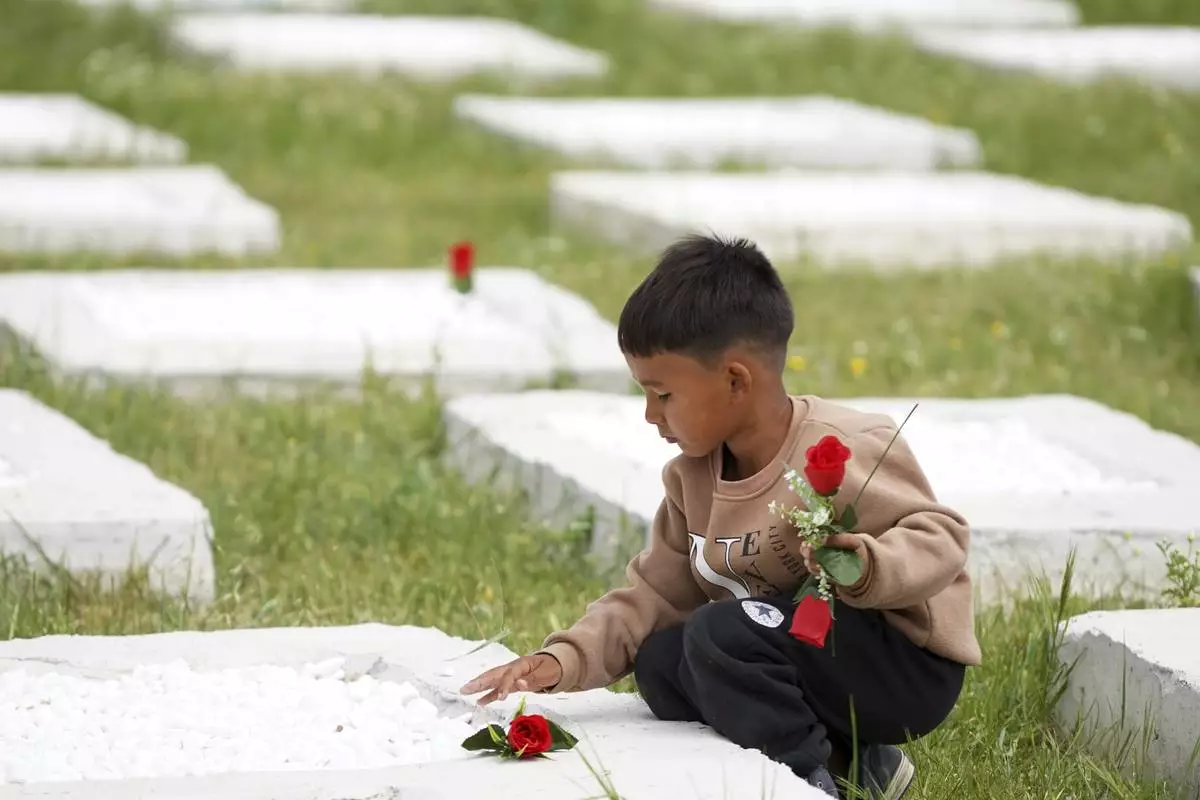
A boy lays flowers on a grave at the cemetery in Kato Tritos village on the northeastern Aegean Sea island of Lesbos, Greece, on Wednesday, April 17, 2024. After years of neglect, a primitive burial ground for refugees who died trying to reach Greece's island of Lesbos has been cleaned up and redesigned to provide a dignified resting place for the dead. (AP Photo/Panagiotis Balaskas)
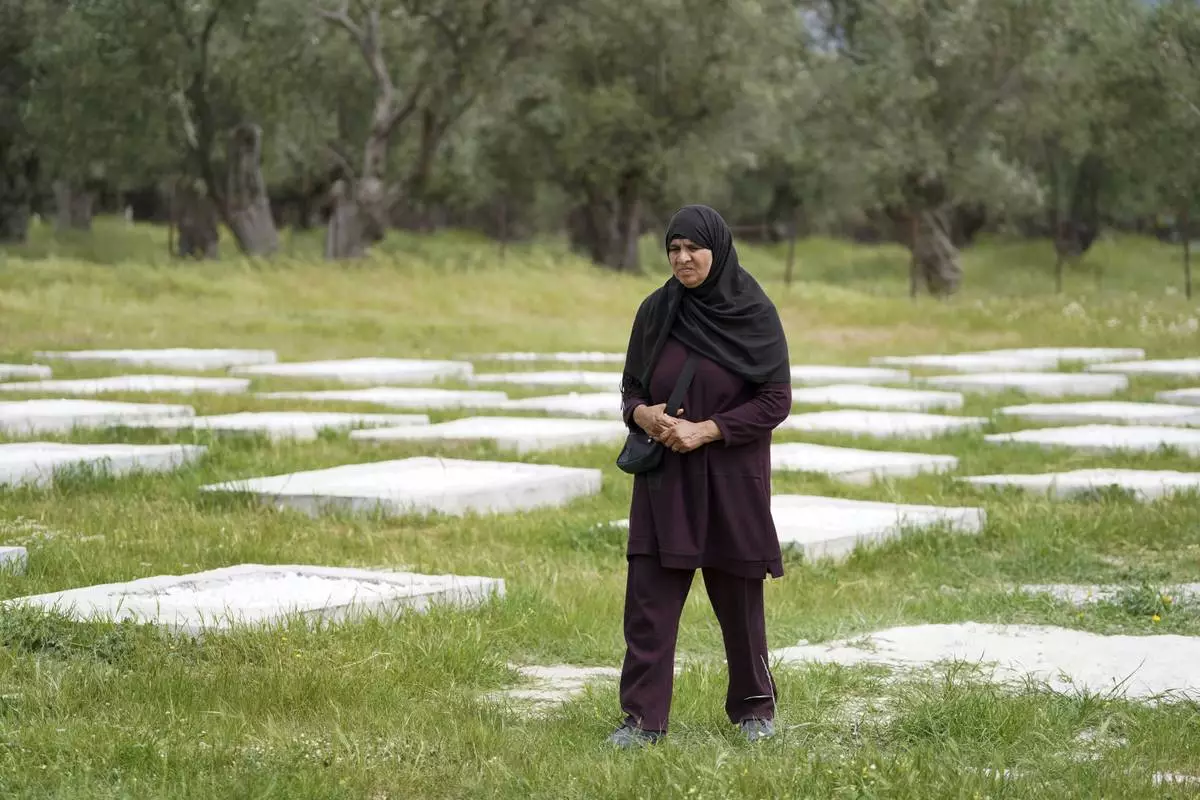
A woman walks at the cemetery in Kato Tritos village on the northeastern Aegean Sea island of Lesbos, Greece, on Wednesday, April 17, 2024. After years of neglect, a primitive burial ground for refugees who died trying to reach Greece's island of Lesbos has been cleaned up and redesigned to provide a dignified resting place for the dead. (AP Photo/Panagiotis Balaskas)
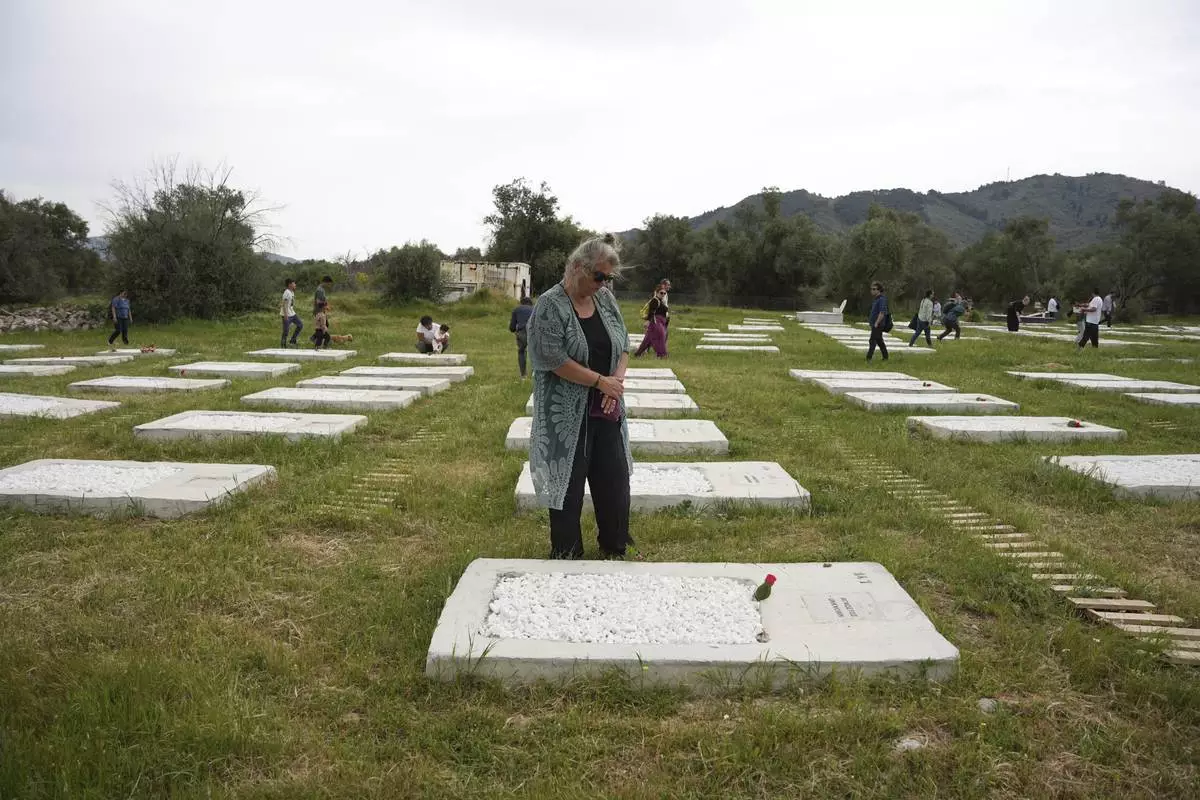
People visit the cemetery at Kato Tritos village on the northeastern Aegean Sea island of Lesbos, Greece, on Wednesday, April 17, 2024. After years of neglect, a primitive burial ground for refugees who died trying to reach Greece's island of Lesbos has been cleaned up and redesigned to provide a dignified resting place for the dead. (AP Photo/Panagiotis Balaskas)
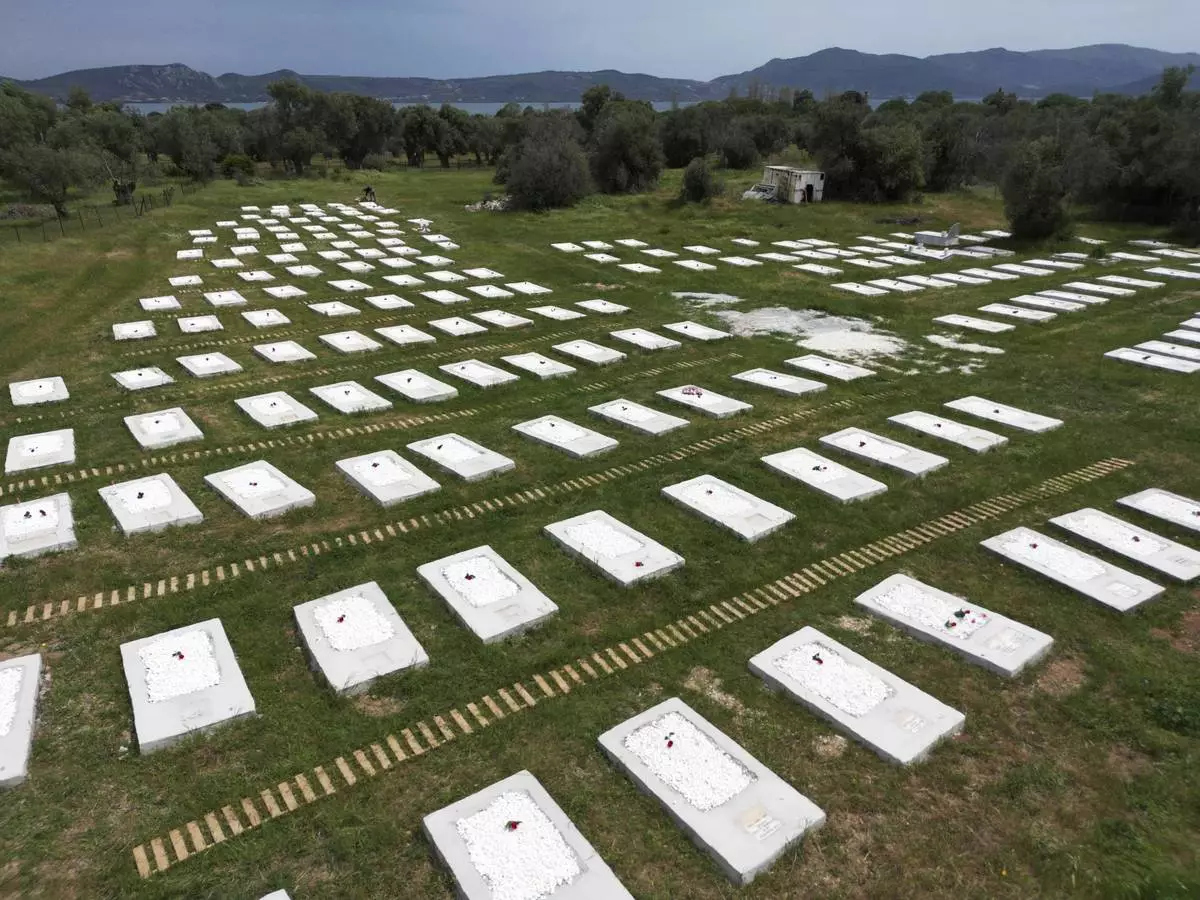
A cemetery is seen from above at Kato Tritos village on the northeastern Aegean Sea island of Lesbos, Greece, on Wednesday, April 17, 2024. After years of neglect, a primitive burial ground for refugees who died trying to reach Greece's island of Lesbos has been cleaned up and redesigned to provide a dignified resting place for the dead. (AP Photo/Panagiotis Balaskas)
TBILISI, Georgia (AP) — Georgia’s Parliament moved a step closer Wednesday to passing a law that critics fear will stifle media freedom and endanger the country’s European Union membership bid, as police used water cannons, tear gas and pepper spray against the tens of thousands of protesters who thronged surrounding streets.
Dozens of people were arrested the night before, and mass rallies have continued daily in the capital, Tbilisi. Protesters denounce the bill as “the Russian law” because neighboring Russia uses similar legislation to stigmatize independent news media and organizations critical of the Kremlin.
The law would require media and noncommercial organizations to register as “pursuing the interests of a foreign power,” if they receive more than 20% of funding from abroad. The ruling Georgian Dream party withdrew a similar proposal last year after large crowds protested.
Eighty-three of Georgia’s 150 lawmakers approved the bill in its second reading, while 23 voted against it. A third and final vote in Parliament is needed before it can be signed into law. Georgian lawmaker Irakli Kobakhidze told reporters on Wednesday that he expected that final vote to happen in mid-May.
Russia-Georgia relations have been complicated and turbulent since the Soviet Union’s collapse in the early 1990s. The two countries fought a short war in 2008 that ended with Georgia losing control of two Russia-friendly separatist regions.
In the aftermath, Tbilisi severed diplomatic ties with Moscow, and the issue of the regions’ status remains a key irritant, even as relations have somewhat improved.
Georgia joined international resolutions condemning Russia's full-scale invasion of Ukraine, but it also became a main destination for Russians fleeing military mobilization and political crackdowns. Even Georgia's ruling party has seen internal tensions over its neighbor.
The Interior Ministry said that 63 people were detained following Tuesday's protest.
Georgian television showed Levan Khabeishvili, chairman of the pro-West United National Movement party, arriving in Parliament on Wednesday morning with bandages on his nose and forehead. Members of Khabeishvili's party said that he had been assaulted by police during the protests.
Purple bruising and cuts were visible around Khabeishvili's left eye as he urged fellow lawmakers to scrap the bill.
“If you are not interested in how the leader of the main opposition party has been beaten up, then — for the sake of those young people who were injured, who were hit on the heads and bruised — I want to ask you once more, even though I do not have any hope, withdraw this law,” he said.
Deputy Interior Minister Aleksandre Darakhvelidze alleged at a briefing Wednesday that Khabeishvili broke through a police cordon the night before and was injured while he “resisted.” Darakhvelidze alleged that protesters and opposition leaders were “constantly committing violence.” Police broke up the protest after demonstrators tried to block entrances to Parliament.
As protesters gathered once more Wednesday, opposition lawmaker Beqa Liluashvili published a live video from the Parliament chamber showing lawmakers shouting and physically confronting each other. One threw a stack of papers at opponents. Others restrained colleagues.
Opposition lawmaker Helene Khoshtaria accused the ruling party of trying to “drag Georgia into Russian influence” and “close off its European future.”
Speaking to The Associated Press outside Parliament, she described authorities’ response to the rallies as “extremely authoritarian" but said it would not dissuade the protesters.
“We do not want the Soviet regime that our parents have experienced," one protester, Kato Salukvadze, told the AP late Tuesday. “I think that everyone should be in the streets and say no to the Russian law and yes to Europe."
Georgian President Salome Zourabichvili, increasingly at odds with the governing party, has criticized the bill and vowed to veto it if it is passed by Parliament. But the governing party can overrule the veto and ask the parliamentary speaker to sign the bill into law.
At a media briefing Wednesday, Kobakhidze spoke openly of Georgian Dream's intention to do so, and defended Tbilisi's forceful response to the protests.
“There will be demonstrations today, during the third reading, during the overriding of the veto. (When the law passes), there will be a few days of discomfort. However, in the long term, we will insure the country against polarization and radicalism for years," Kobakhidze told reporters.
EU foreign policy chief Josep Borrell posted on X on Wednesday that Tbilisi's use of force against the demonstrators was “unacceptable.”
“Georgia is an EU candidate country, I call on its authorities to ensure the right to peaceful assembly,” he said.

A demonstrator gestures while arguing with the police during an opposition protest against "the Russian law" near the Parliament building in Tbilisi, Georgia, on Wednesday, May 1, 2024. Protesters denounce the bill as "the Russian law" because Moscow uses similar legislation to stigmatize independent news media and organizations critical of the Kremlin. (AP Photo/Zurab Tsertsvadze)

Demonstrators wave Georgian national flag during an opposition protest against "the Russian law" near the Parliament building in Tbilisi, Georgia, on Wednesday, May 1, 2024. Protesters denounce the bill as "the Russian law" because Moscow uses similar legislation to stigmatize independent news media and organizations critical of the Kremlin. (AP Photo/Zurab Tsertsvadze)

Demonstrators argue with police that blocked them during an opposition protest against "the Russian law" near the Parliament building in Tbilisi, Georgia, on Wednesday, May 1, 2024. Protesters denounce the bill as "the Russian law" because Moscow uses similar legislation to stigmatize independent news media and organizations critical of the Kremlin. (AP Photo/Zurab Tsertsvadze)

Demonstrators blocked by the police wave a EU flag during an opposition protest against "the Russian law" near the Parliament building in Tbilisi, Georgia, on Wednesday, May 1, 2024. Protesters denounce the bill as "the Russian law" because Moscow uses similar legislation to stigmatize independent news media and organizations critical of the Kremlin. (AP Photo/Zurab Tsertsvadze)

Police face demonstrators during an opposition protest against "the Russian law" near the Parliament building in Tbilisi, Georgia, on Wednesday, May 1, 2024. Protesters denounce the bill as "the Russian law" because Moscow uses similar legislation to stigmatize independent news media and organizations critical of the Kremlin. (AP Photo/Zurab Tsertsvadze)

A woman shows a heart standing in front of riot police during an opposition protest against "the Russian law" near the Parliament building in Tbilisi, Georgia, on Wednesday, May 1, 2024. Clashes erupted between police and opposition demonstrators protesting a new bill intended to track foreign influence that the opposition denounced as Russia-inspired. (AP Photo/Zurab Tsertsvadze)
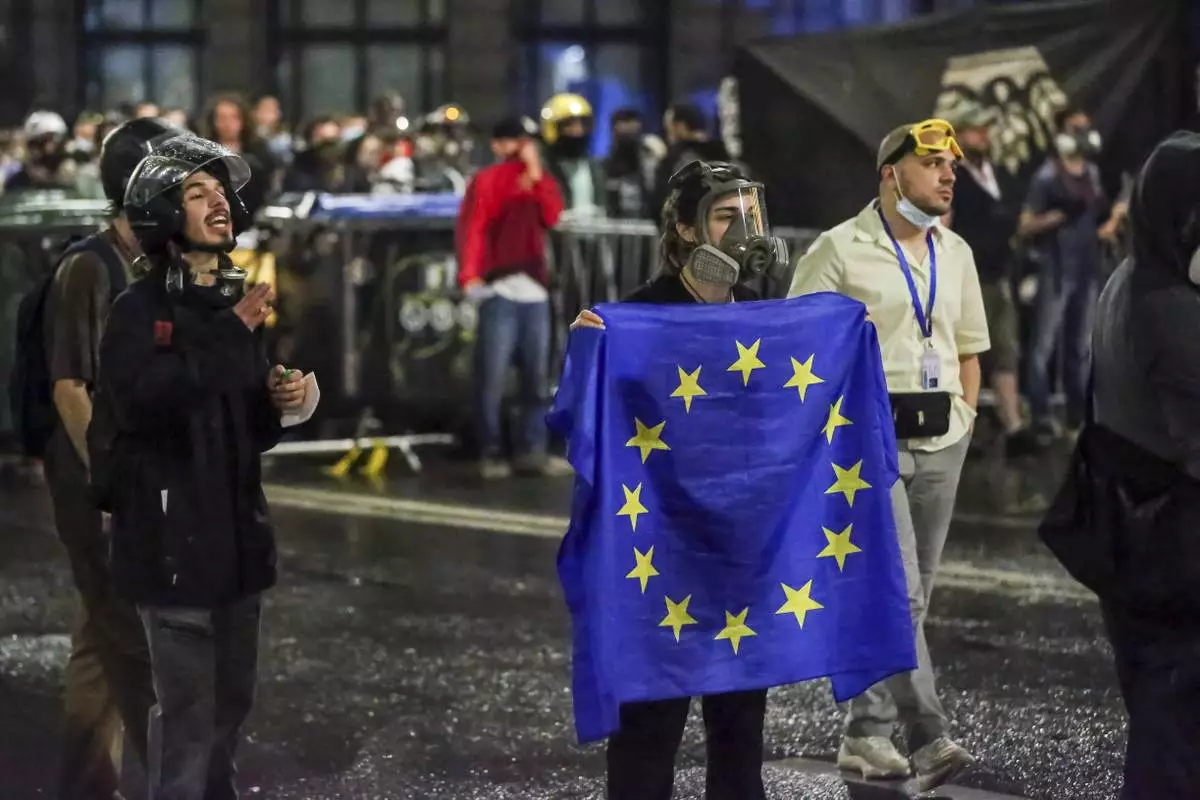
A demonstrator stands with a EU flag in front of police block during an opposition protest against "the Russian law" near the Parliament building in Tbilisi, Georgia, on Wednesday, May 1, 2024. Clashes erupted between police and opposition demonstrators protesting a new bill intended to track foreign influence that the opposition denounced as Russia-inspired. (AP Photo/Zurab Tsertsvadze)
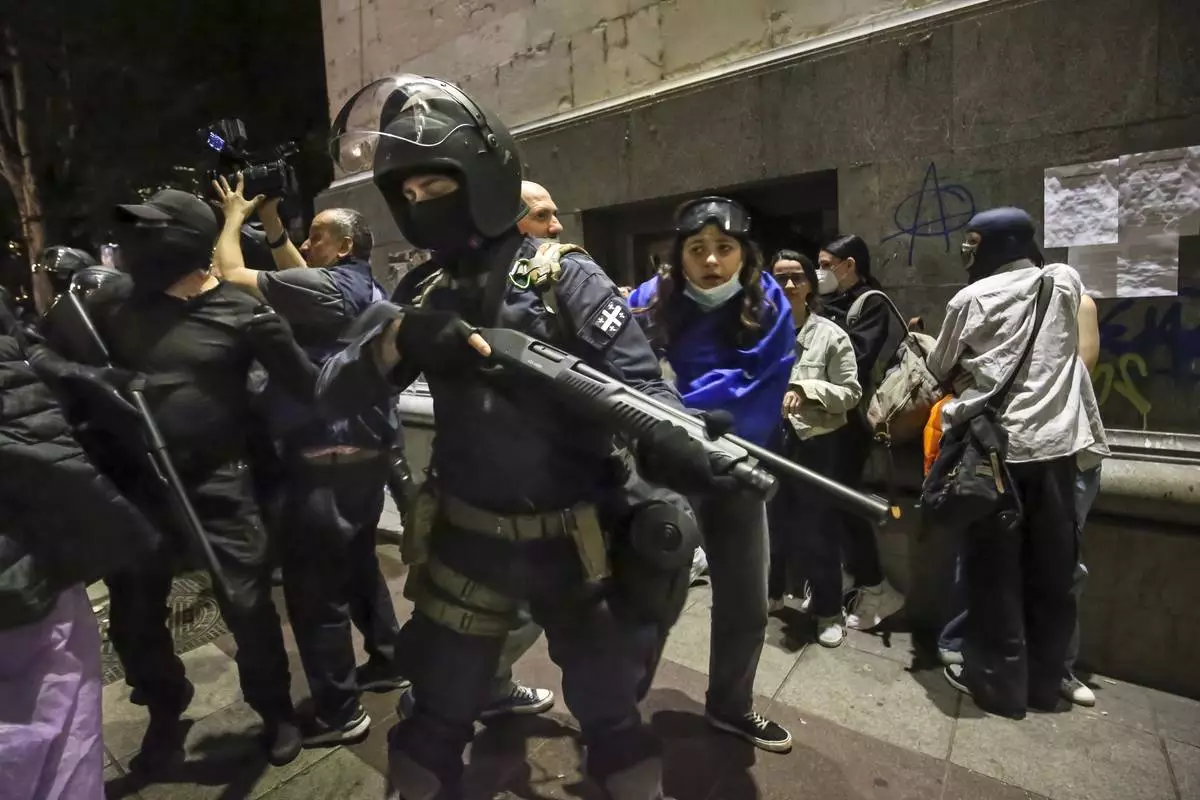
Riot policemen stand ready to fire gas grenade during an opposition protest against "the Russian law" near the Parliament building in Tbilisi, Georgia, on Wednesday, May 1, 2024. Clashes erupted between police and opposition demonstrators protesting a new bill intended to track foreign influence that the opposition denounced as Russia-inspired. (AP Photo/Zurab Tsertsvadze)
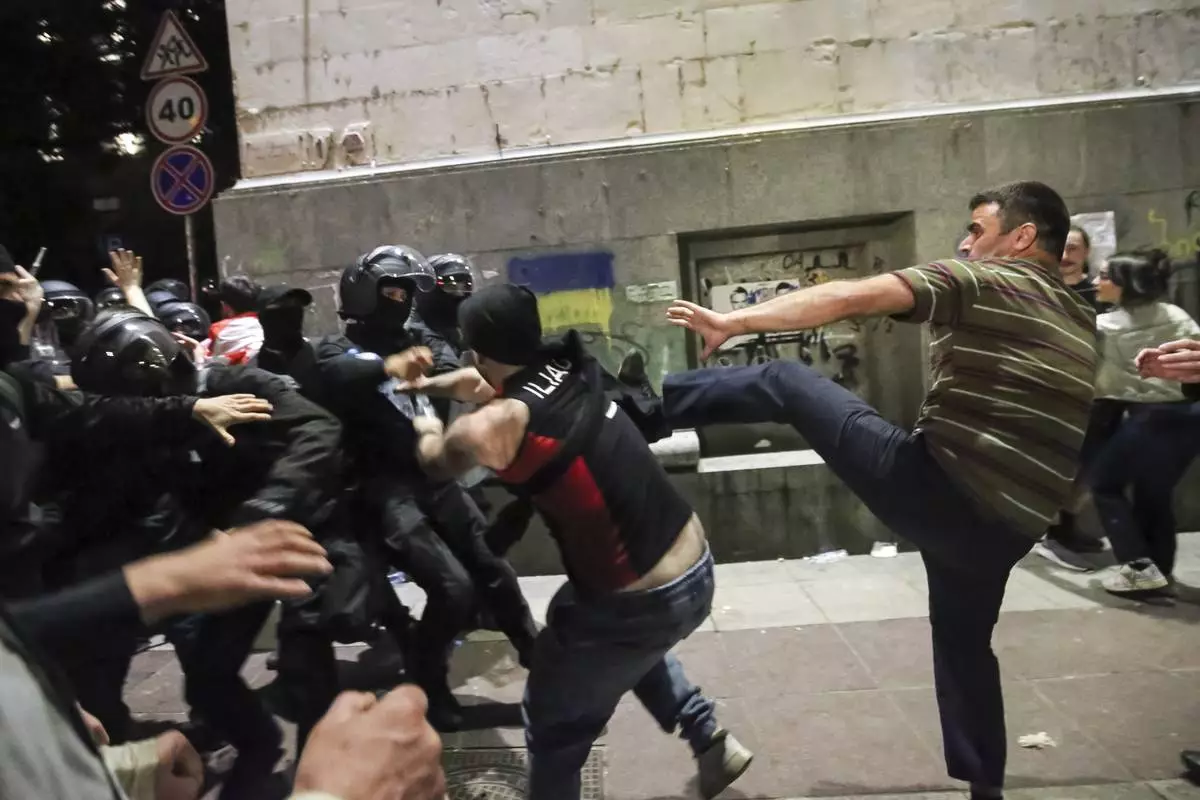
Demonstrators scuffle with riot police during an opposition protest against "the Russian law" near the Parliament building in Tbilisi, Georgia, on Wednesday, May 1, 2024. Clashes erupted between police and opposition demonstrators protesting a new bill intended to track foreign influence that the opposition denounced as Russia-inspired. (AP Photo/Zurab Tsertsvadze)
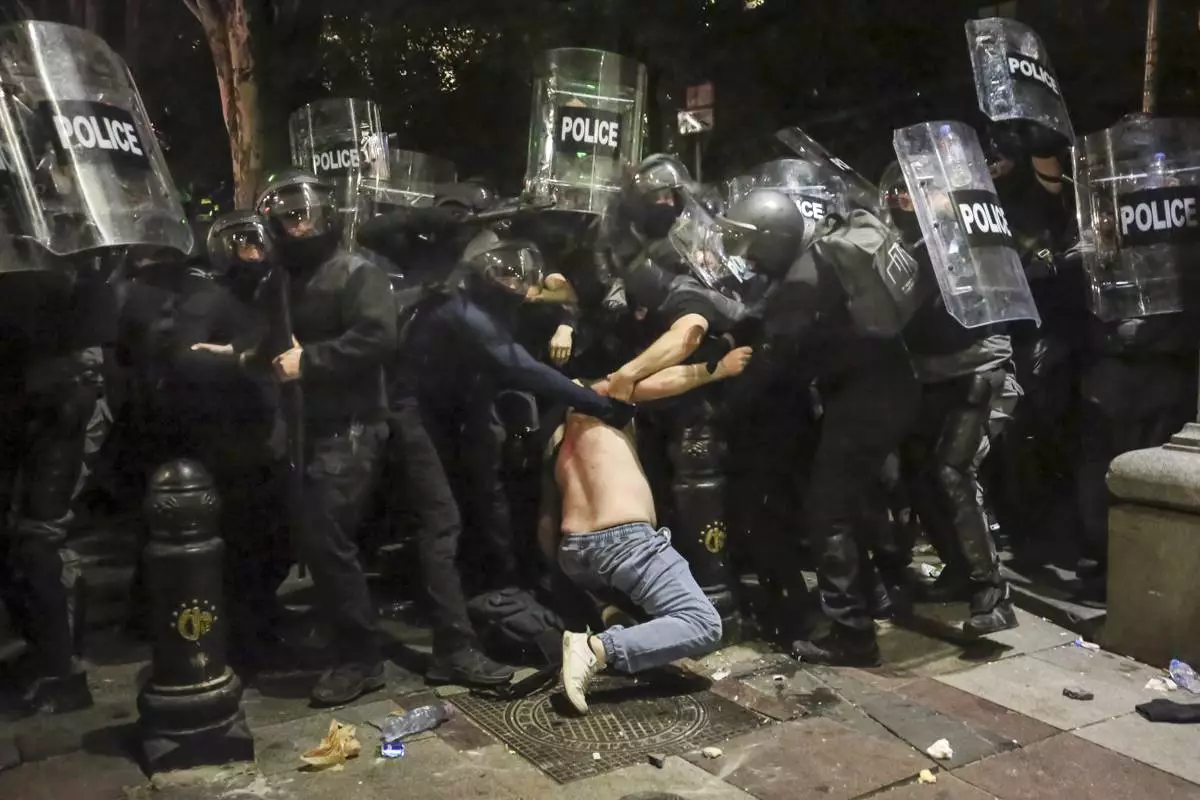
Riot police detain a demonstrator during an opposition protest against "the Russian law" near the Parliament building in Tbilisi, Georgia, on Wednesday, May 1, 2024. Clashes erupted between police and opposition demonstrators protesting a new bill intended to track foreign influence that the opposition denounced as Russia-inspired. (AP Photo/Zurab Tsertsvadze)
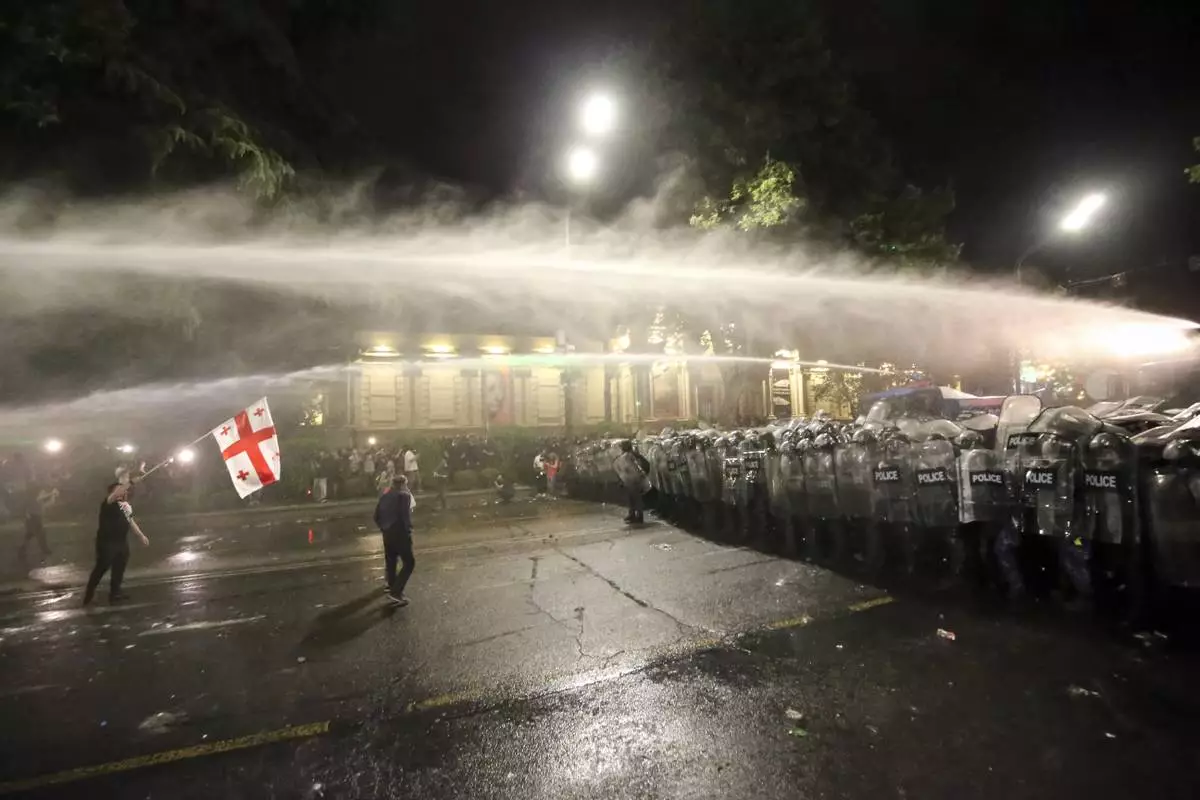
Riot police use a water cannon during an opposition protest against "the Russian law" near the Parliament building in Tbilisi, Georgia, on Wednesday, May 1, 2024. Clashes erupted between police and opposition demonstrators protesting a new bill intended to track foreign influence that the opposition denounced as Russia-inspired. (AP Photo/Zurab Tsertsvadze)
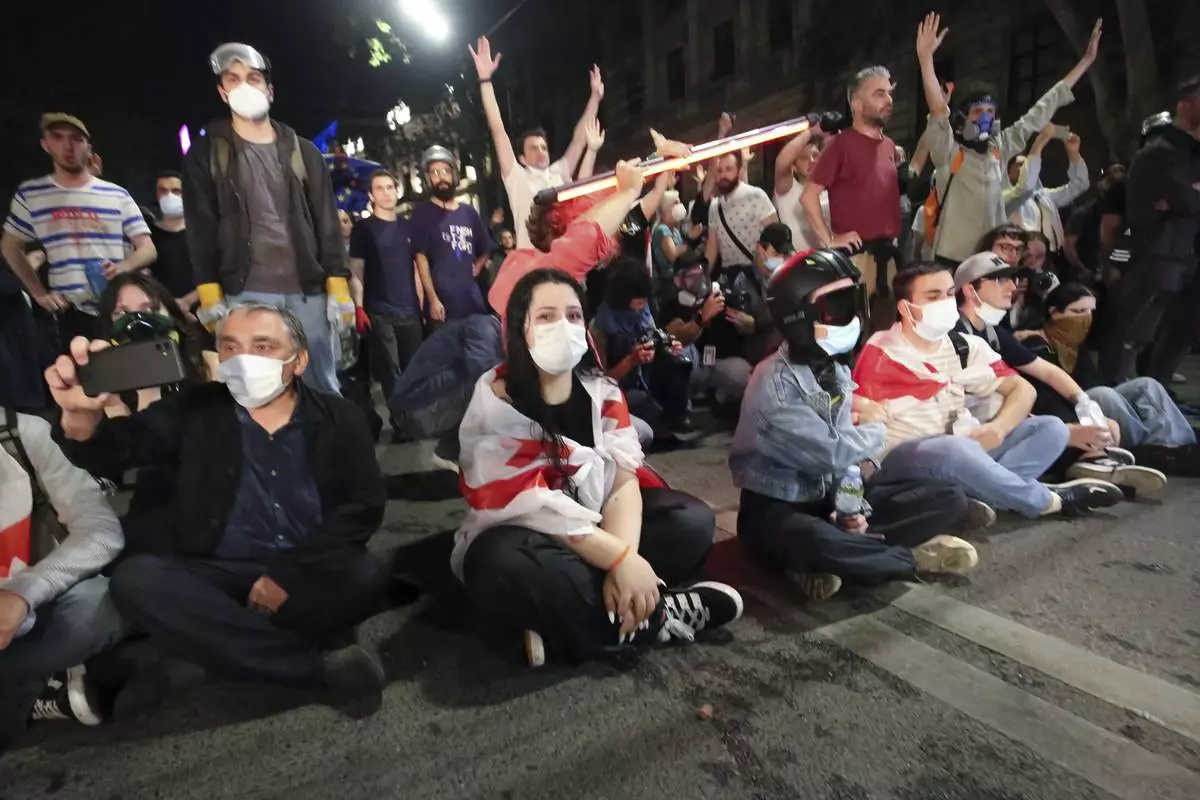
Demonstrators sit in front of police line during an opposition protest against "the Russian law" near the Parliament building in Tbilisi, Georgia, on Tuesday, April 30, 2024. Clashes erupted between police and opposition demonstrators protesting a new bill intended to track foreign influence that the opposition denounced as Russia-inspired. (AP Photo/Zurab Tsertsvadze)








